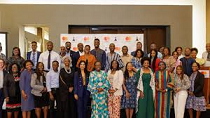World Data Lab (WDL), in partnership with the Mastercard Foundation, announced the Nigerian launch of the Africa Youth Employment Clock on Tuesday.
According to WDL projections, Africa will experience its highest-ever youth population growth in this decade (2021–2030), with the population projected to increase by almost 100 million between 2023 and 2030. The WDL added that against this backdrop, enabling young people in Africa to access dignified and fulfilling work is more important than ever.
At the launch, minister of labour and employment, Hon. Nkeiruka Onyejeocha, noted, “Youth employment is a pillar of Nigeria’s socio-economic future. It impacts everything from economic growth to the stability and productivity of our labour market. The youth employment agenda is vital for Nigeria’s development.”
The minister of budget and economic planning, Sen. Abubakar Atiku Bagudu, also inaugurated the Africa Youth Employment Clock, stating, “As Africa faces unprecedented growth in its youth population, we must harness this demographic potential by creating meaningful employment opportunities. The Africa Youth Employment Clock is a powerful tool enabling policymakers and stakeholders to access real-time data, fostering informed decisions to drive youth employment initiatives across the continent.
“The Africa Youth Employment Clock is a pioneering initiative that offers reliable and comparable labour market statistics, projecting trends in youth employment across the continent until 2030. Our mission is to provide decision-makers with the crucial data to drive meaningful change for the world’s youngest workforce. We are honoured to collaborate with the Mastercard Foundation to advance a deeper understanding of youth employment in Africa,” said Dr Reshma Sheoraj, Vice President of Strategic Engagements at World Data Lab.
“Aligned with our mission to enable 30 million young Africans to access dignified and fulfilling work by 2030, the Africa Youth Employment Clock will provide critical labour market insights. In Nigeria, where we have the continent’s largest youth population, this tool will be precious in shaping strategies that address the challenges and opportunities young Nigerians face in the workforce. As our youth population grows, we recognise their potential as dynamic leaders capable of solving local and global challenges,” said Rosy Fynn, Nigeria’s Country Director at the Mastercard Foundation.





